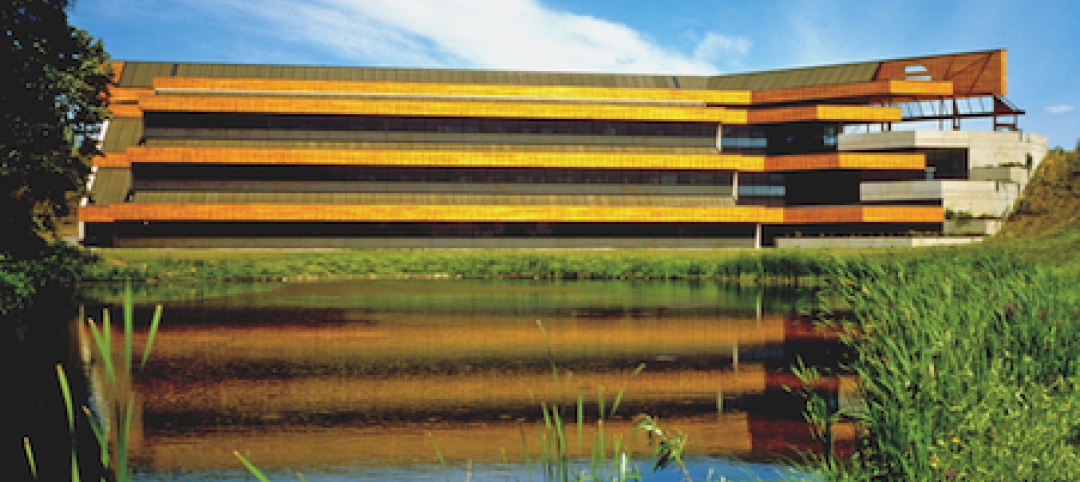The American Institute of Architects (AIA) Long Island Chapter presented its 2011 Archi Award Commendation for Health Care to John W. Baumgarten Architect, P.C., for its renovation of the Glengariff Healthcare Center’s Pratt Pavilion for Rehabilitation and Healing in Glen Cove, N.Y.
The AIA presented the Jericho-based Baumgarten firm with this award for the firm’s work at the one-time Gold Coast manse after a juried competition. The award was presented at the AIA chapter’s 47th Annual Awards Celebration on Oct. 19 at Oheka Castle, an event space in Huntington, N.Y.
The Baumgarten firm, a major player in the design of healthcare facilities throughout the tri-state area for many years, encountered a myriad of challenges in remodeling the mansion.
The original building, which dates to 1912 and sits on12 acres on the shore of the Long Island Sound, was converted to a skilled nursing facility in the 1970s. The property was sold to its current owner, Sanjay Ahuja, in 2008. The project started with the carefully engineered removal of a 2-foot thick brick-bearing wall in order to expand the building’s main lobby. The removal of this circa 1912 construction involved a logistically sophisticated sequence of bracing, shoring and underpinning, along with the threading in of new supporting steel to carry the floors above. The next phase of the project involved the conversion of an underutilized dining room into a physical therapy suite modeled after an upscale health club.
As a result of the renovation, the lobby became a significant focal point with its open and airy feeling inviting residents/patients and their families to a comfortable and warm area to socialize and congregate.
The two-story lobby features inlaid marble floors and wood-paneled wainscoting that pays homage to the building’s history. The existing grand lobby stair with its ornamental railings and ceilings were preserved, as was an original marble fireplace. Capturing abutting office suites and creating distinct seating areas defined by inlaid carpeting, further expanded the lobby footprint.
The AIA Archi Award jury praised the project for creating a “bright environment“ and for its “interesting use of furnishings.” BD+C
Related Stories
| Oct 12, 2010
Building 13 Naval Station, Great Lakes, Ill.
27th Annual Reconstruction Awards—Gold Award. Designed by Chicago architect Jarvis Hunt and constructed in 1903, Building 13 is one of 39 structures within the Great Lakes Historic District at Naval Station Great Lakes, Ill.
| Oct 12, 2010
Full Steam Ahead for Sustainable Power Plant
An innovative restoration turns a historic but inoperable coal-burning steam plant into a modern, energy-efficient marvel at Duke University.
| Oct 12, 2010
From ‘Plain Box’ to Community Asset
The Mid-Ohio Foodbank helps provide 55,000 meals a day to the hungry. Who would guess that it was once a nondescript mattress factory?
| Oct 11, 2010
HGA wins 25-Year Award from AIA Minnesota
HGA Architects and Engineers won a 25-Year Award from AIA Minnesota for the Willow Lake Laboratory.
| Oct 11, 2010
MBMA Releases Fire Resistance Design Guide for metal building systems
The Metal Building Manufacturers Association (MBMA) announces the release of the 2010 Fire Resistance Design Guide for Metal Building Systems. The guide provides building owners, architects, engineers, specifiers, fire marshals, building code officials, contractors, product vendors, builders and metal building manufacturers information on how to effectively meet fire resistance requirements of a project with metal building systems.
| Oct 11, 2010
Rhode Island is the first state to adopt IGCC
Rhode Island is the first state to adopt the International Green Construction Code (IGCC). The Rhode Island Green Buildings Act identifies the IGCC as an equivalent standard in compliance with requirements that all public agency major facility projects be designed and constructed as green buildings. The Rules and Regulations to implement the Act take effect in October 2010.
| Oct 8, 2010
Union Bank’S San Diego HQ awarded LEED Gold
Union Bank’s San Diego headquarters building located at 530 B Street has been awarded LEED Gold certification from the Green Building Certification Institute under the standards established by the U.S. Green Building Council. Gold status was awarded to six buildings across the United States in the most recent certification and Union Bank’s San Diego headquarters building is one of only two in California.
| Oct 6, 2010
Windows Keep Green Goals in View
The DOE's National Renewable Energy Laboratory has almost 600 window openings, and yet it's targeting LEED Platinum, net-zero energy use, and 50% improvement over ASHRAE 90.1. How the window ‘problem’ is part of the solution.
| Oct 6, 2010
From grocery store to culinary school
A former West Philadelphia supermarket is moving up the food chain, transitioning from grocery store to the Center for Culinary Enterprise, a business culinary training school.
| Sep 30, 2010
Luxury hotels lead industry in green accommodations
Results from the American Hotel & Lodging Association’s 2010 Lodging Survey showed that luxury and upper-upscale hotels are most likely to feature green amenities and earn green certifications. Results were tallied from 8,800 respondents, for a very respectable 18% response rate. Questions focused on 14 green-related categories, including allergy-free rooms, water-saving programs, energy management systems, recycling programs, green certification, and green renovation.













